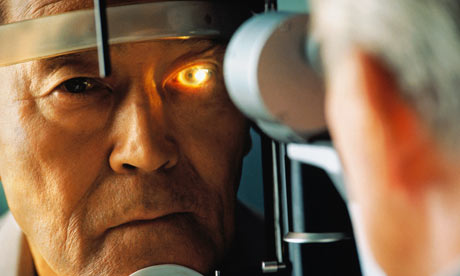
Millions of people could have their eyesight saved thanks to ground-breaking laser treatment that has the potential to eradicate the most common cause of blindness.
One of Britain's leading eye experts has developed a technique to reverse the disabling effects of age-related macular degeneration (AMD), which leaves many older people unable to read, drive or live independently, and eventually robs them of sight in one or both eyes.
Professor John Marshall has developed a way of "cleaning" eyes which, due to the ageing process, have accumulated tiny particles of debris which start to cloud their sight. His pioneering technique uses a painless "short pulse" laser to solve the otherwise intractable problem of how to help the eye's waste disposal system do its job after it has been weakened by age.
Marshall, a senior ophthalmologist at King's College London, said he hopes this "retinal regeneration therapy" could prevent and reverse the onset of AMD.
The technique works by rejuvenating a thin membrane behind the retina, called Bruch's membrane. Over time this membrane becomes so "clogged" with the by-product of cell renewal that vital nutrients can no longer cross from the bloodstream into the retina and excess material becomes trapped, unable to pass in the other direction. This leads to the death of retinal cells and, in time, to AMD and eventual blindness.
Marshall's technique promises to prevent and even reverse the process, allowing the eye to return to something like its youthful, uncluttered state. In a clinical trial involving more than 100 diabetics, Marshall found that focusing a laser beam on one part of the retina helps stimulate the release of enzymes, which then set about cleaning up the waste material. Participants reported this led to a marked improvement in their sight.
Marshall now plans to conduct a wider trial among those suffering the early stages of AMD. In most cases the "clogging" begins when people reach their mid-40s, but does not always lead to significant sight loss. Some are more at risk, because of a number of factors in addition to their age. These include genetics - such as a family history of AMD. Women are more likely to suffer, and environmental factors can play a part, with smokers at greater risk.
AMD is the leading cause of blindness in those aged over 60 in the western world. Initially it causes blurred or distorted central vision, but worsens over time leaving sufferers unable to do everyday tasks. About a quarter of all over-60s in the UK suffer some loss of vision as a result of the condition.
Eye specialists say Marshall's discovery could mark a breakthrough in tackling the condition. There is currently no effective treatment for "dry" AMD - the less serious form of the disease. The drugs Lucentis and Avastin are used to treat the more disabling and aggressive "wet" version, but these usually do little more than stabilise the condition. Marshall's use of laser technology to restore an ailing eye could therefore open up a whole new method of treatment.
Conventional lasers have been used previously, but they have damaged the eye's light-sensitive cells in the process. Marshall said: "The laser I've used is a totally new soft-pulse laser which doesn't cause any damage to any of the nearby tissues, unlike conventional lasers. All it does is stimulate the required chemical reaction. And it treats both 'dry' AMD and the effects of ageing."
Marshall's next clinical trial of the technique will be with patients who are already being treated for AMD in one eye. He hopes that it will prove that treating the patient's other eye will delay the onset of AMD by up to seven years.
If further trials are successful, it could open many possibilities. "In the short term it could benefit anybody with a family history or with diagnostic signs that they are at high risk of AMD," Marshall said. "In the longer term it could be that we all decide to have our retinas cleaned so that we don't develop these problems later in life."
Eyesight specialists say Marshall's research could be of huge importance. Tom Pey of Guide Dogs for the Blind, which funded the work, said: "This is potentially a huge breakthrough for millions of people across the world."

